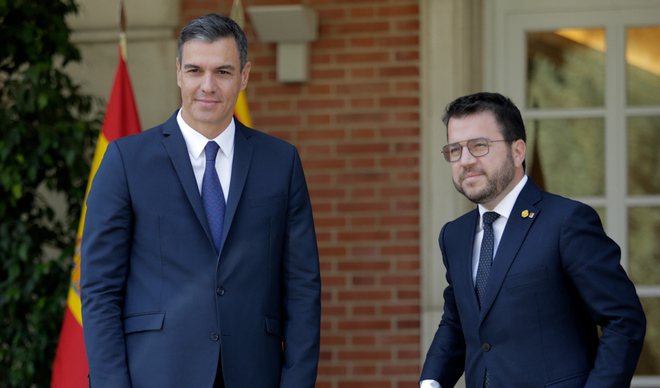The negotiating table between the central and Catalan governments will meet in Madrid in the last week of this month of July. It will be its third call after the inaugural one in February 2020 and the one held in Barcelona on September 15. This has been the agreement reached this Friday in Moncloa by Pedro Sánchez and Pere Aragonès.
The new appointment, which the presidents will not attend and which, for the moment, does not have a specific agenda, should have the virtue of consolidating the relaunch of relations between the President of the Government and ERC. For Sánchez, it is a crucial objective to have the support of the pro-independence formation that, with its 13 seats in Congress, is a key prop to face the remainder of the legislature with more security.
Sánchez has been trying for weeks to heal the wounds that the Pegasus case had caused in the Generalitat and very especially in the president himself, one of those spied on by the CNI. A wound that was revealed to be bleeding in the vote on the labor reform, with ERC betting against the Government and that was finally only saved by the error of a PP deputy.
On that occasion, Pedro Sánchez peered into the abyss and, aware of the enormous risk involved in continuing to tempt fate, ordered his closest team to start looking for ways to rebuild the bridges. In this context, the two meetings are framed -the last just a week ago- between the Minister of the Presidency, Félix Bolaños, and his counterpart in the Generalitat, the Minister Laura Vilagrà.
The need to speed up a face-to-face meeting between the two presidents was established in Moncloa when ERC’s deep misgivings about supporting a bill, the Democratic Memory bill, emblematic for the Government, were confirmed, as well as the rejection forceful of the formation to the announcement of the increase of the cost in Defense.
From that concern was born the offer to hold the meeting between Sánchez and Aragonès on the first possible date, this Friday, just one day after concluding the Debate on the State of the Nation. ERC put on its side an abstention on the Memory Law, thus facilitating its approval in Congress and only a timid resolution proposal in the great debate proposing “not to increase” military spending.
Of the almost two hours that the meeting between the two presidents lasted, no further agreements emerged, but for both parties, the fact of resuming the relationship and reopening the dialogue is a satisfactory result that should begin to be rounded off in the call for the dialogue table scheduled for the end of the month.
Aragonès needs to show the pro-independence electorate some progress in his strategy of non-confrontation with Madrid, fiercely criticized by his own partner in the Government, JxCAT. For his part, Sánchez requires the support of the ERC to try to conclude the legislature with the least possible shocks.
This Friday, according to the version of the meeting provided by the Minister Spokesperson, Isabel Rodríguez, Pedro Sánchez advocated that the dialogue table and the possible agreements reached therein be “representative of a social majority.” In this way, Moncloa conveys its desire that members of the two formations that make up the Executive of the Generalitat: ERC and JxCAT attend the event. The postconvergents have already absented themselves from the meeting held in Barcelona last September and publicly disdain the usefulness of the forum.
Rodríguez denied that crucial issues for the independence movement had been addressed during the meeting, such as the aspiration that Catalonia be recognized the right to hold a referendum on self-determination. In this field, the Spokesperson Minister affirmed, the differences “continue to be enormous”. The central government remains firm in defending the autonomous State and Title VIII of the Constitution.
Neither was the possibility of reforming the criminal types of sedition and rebellion, a modification for which, according to Pedro Sánchez, there is not a sufficient majority. Nor was the commitment to advance in the dejudicialization of the independence conflict, as agreed by Bolaños and Vilagrà in their last meeting with the argument that this would avoid exacerbating the “polarization” of positions. Pere Aragonès, for his part, in an appearance before the press at the Generalitat Delegation in Madrid, expressed his conviction that results will begin to be seen in this area at the dialogue table meeting. For the president, “addressing the dejudicialization and the end of the repression is essential to move forward” although, “as long as the Catalans cannot decide freely on the independence of their country, the root of the problem will not be solved.”
Conforms to The Trust Project criteria
















